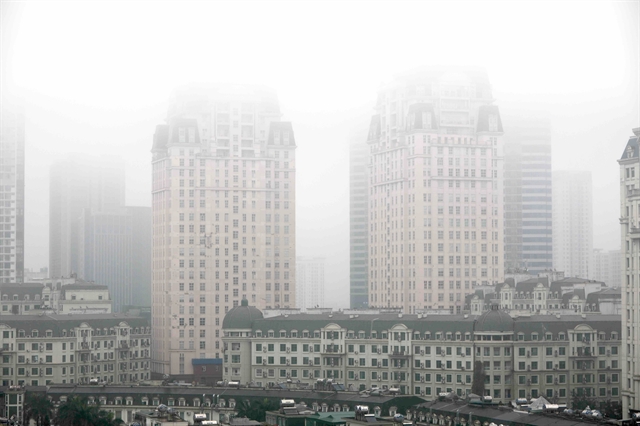.jfif) Opinion
Opinion

Air pollution in Hà Nội increased in the early days of this month, with the air quality index (AQI) soaring at night and in the early morning. Mai Trọng Thái, director of the Hà Nội Sub-department of Environmental Protection, speaks to Hà Nội Mới (New Hà Nội) about the issue.

|
| Air pollution in Hà Nội. — VNA/VNS Photo Thanh Tùng |
Air pollution in Hà Nội increased in the early days of this month, with the air quality index (AQI) soaring at night and in the early morning. Mai Trọng Thái, director of the Hà Nội Sub-department of Environmental Protection, speaks to Hà Nội Mới (New Hà Nội) about the issue.
Why has AQI in Hà Nội gotten worse recently?
From December 4 to 11, air quality in Hà Nội dropped sharply at night and in the early morning. On December 6, 7 and 11, at the Hàng Đậu, Phạm Văn Đồng, Thành Công and Minh Khai measurement stations, the AQI index increased to an unhealthy level (from 151 to 200).
Some factors behind this phenomenon, including the pollutants caused by traffic, construction and industrial production in the inner city accumulated from the previous afternoon cannot be diffused, and the northeast monsoon brings fine dust from outside into Hà Nội.
The change of weather has the most obvious impact on the decreasing of air quality in recent days. Hà Nội is in a dry period and wind speed is low. In the evening, the temperature of the air layer close to the ground decreases faster than the upper air layers due to the process of infrared radiation, meaning PM2.5 fine dust is unable to spread away [PM2.5 refers to atmospheric particulate matter (PM) that has a diameter of less than 2.5 micrometers, which is about three per cent the diameter of a human hair]. Only when the sun heats the air close to the ground, can pollutants and fine dust be released.
How can Hà Nội improve air quality?
In order to improve air quality, in recent years, Hà Nội has implemented many solutions. Specifically, the city has invested in 35 air quality monitoring stations, providing information on air environment indicators for people to prevent and take measures to protect their health. At the same time, the city has effectively deployed directives, plans and programmes such as a ban on traditional charcoal stoves and burning of straw and crop residues after harvest.
During dry weather, the city instructed districts and towns to increase the spraying of water to wash roads and limit dust spreading.
The city also directs forces to strengthen inspection and guide project owners, construction and traffic construction units, to strictly implement measures to prevent and minimise dust and gas emissions, strictly handle acts of violating the law on environmental protection.
Do you have any recommendations for people when air pollution increases?
During times of high air pollution, people should limit outdoor activities, not open windows in the early morning, wear a mask when going out, plant trees around the house to prevent dust and clean the air.
People with respiratory diseases, the elderly, and people with cardiovascular diseases need to implement more stringent preventive measures. If there are health abnormalities, people need to seek medical guidance. Ideally, people should refer to information on air quality on the website moitruongthudo.vn to take initiatives in effective prevention measures. — VNS




